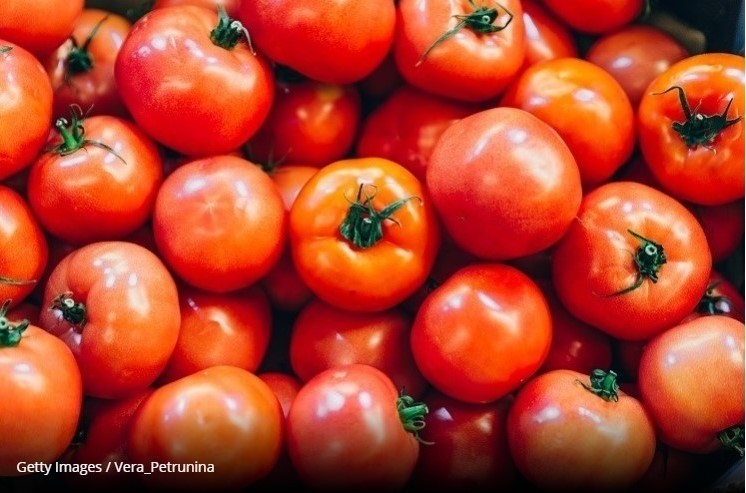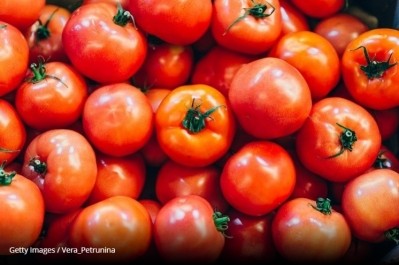New evidence supports the restorative effects of phytonutrients

The research, funded by Israeli ingredients producer Lycored, showed that carotenoids from tomato extract inhibited the secretion of the MMP-1 enzyme (responsible for collagen damage) by around 50% and completely restored pro-collagen secretion.
The authors therefore speculate that supplementation could reduce oxidative stress-induced damage, with particular benefits for skin health.
In addition, findings may have relevance in efforts to reduce skin damage caused by UV radiation and environmental pollutants, as well as the natural ageing process, they say.
Dr Karin Hermoni, Head of Science & Product at Lycored commented: “We’ve long known about the many links between the components of our diet and the health of our skin.
“This study provides exciting new evidence that the carotenoids and other phytonutrients in Lycomato offer significant protection against the damage caused by oxidative stress.
“It also demonstrates that it’s a perfect partner for collagen in skin health supplements, and in anti-aging products in particular.”
Oxidative stress
Epidemiological and clinical studies indicate that a diet rich in fruit and vegetables improves skin health, and that plant-derived compounds (phytonutrients) reduce oxidative stress-induced skin damage.
The aim of the current study was to investigate the effect of oxidative stress on primary human dermal fibroblasts and the ability of carotenoid phytonutrients and the pro-collagen hormone oestradiol to protect skin cells from reactive oxidative stress (ROS-induced) damage.
Oestradiol plays an important role in maintaining skin health. Production is impaired during menopause due to a reduction in oestradiol levels, although treatment with oestrogens (hormonal replacement therapy) increases collagen levels and improves skin elasticity.
Study method
Researchers induced oxidative stress by exposing normal human dermal fibroblasts (NHDF) to progressive concentrations of hydrogen peroxide (H2O2), leading to cell death and decreased collagen secretion, which can cause thinning of the dermis and reductions in skin elasticity.
To investigate whether phytonutrients can protect NHDFs from H2O2-induced oxidative damage, cells were pre-incubated for 24-hours and treated with increasing concentrations of tomato or rosemary extracts, or oestradiol and subsequently exposed to H2O2 for an additional 24 hours, along with phytonutrients.
The tomato extract (Lycomato) and rosemary extract were supplied by Lycored. Tomato pulp contained 6% lycopene, additional carotenoids phytoene, phytofluene and beta-carotene, as well as fiat-soluble components (tocopherols and phytosterols). Oestradiol was obtained from US biotech company, Sigma-Aldrich.
Damage reversal
“Large and significant effects” were observed after pre-treatment and both tomato and rosemary extracts appeared to reverse the effects of H2O2.
The study authors commented: “Tomato extract reduced the H2O2-induced rise in MMP-1 secretion by about 50% and completely restored pro-collagen secretion.
“Similarly, rosemary extract decreased MMP-1 secretion and increased pro-collagen secretion to their basal levels.”
A significant reduction in ROS damage was noted, following pre-treatment with tomato and rosemary extract, but protective effects were especially enhanced with a combination of rosemary and tomato extracts compared to each individual compound.
“A significant reduction in MMP-1 secretion was evident only when the cells were treated with the phytonutrient combination,” they write.
Overall, the protective role of oestradiol was stronger than phytonutrients with skin cells exhibiting complete resistance to the damaging effects of H2O2 when the hormone was present.
Similar to the effects of the phytonutrients, oestradiol decreased MMP-1 secretion and increased pro-collagen secretion back to basal levels.
Conclusion
The authors assert that the study results demonstrate the efficacy of carotenoids, polyphenols, and oestradiol in protecting dermal fibroblasts from ROS-induced damage.
They suggest a balanced diet rich in phytonutrients may improve skin health and appearance, while improvements may also be achieved with topical application of oestradiol and crude or purified dietary compounds.
In addition, findings could be relevant to various other pathologies such as inflammation, neurodegenerative and cardiovascular diseases, and cancer, they add.
Source: Antioxidants
Published online: doi.org/10.3390/antiox10122023
‘The Protective Effect of Carotenoids, Polyphenols, and Estradiol on Dermal Fibroblasts under Oxidative Stress’
Authors: Aya Darawsha, Aviram Trachtenberg, Joseph Levy, and Yoav Sharoni















